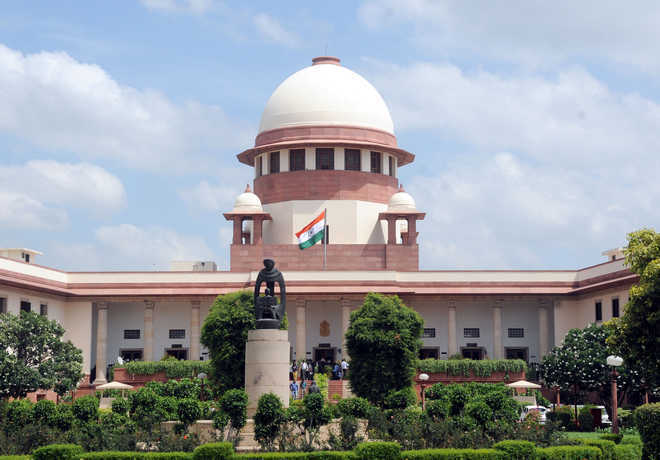
To prevent misuse of the directions, the top court said the burden would be on the accused to prove “by a preponderance of clear evidence” that he is suffering with severe mental illness.
New Delhi, April 18
In a historic verdict, the Supreme Court has given a ray of hope to people on death row who develop “severe mental illness” post-conviction, saying their health condition would now be a “mitigating” factor for appellate courts for sparing them from the gallows.
An accused could till now take the plea of “legal insanity” under the Indian Penal Code (IPC) to avoid criminal prosecution and the defence was “made relatable to the moment when the crime is committed”.
A three-judge bench headed by Justice N V Ramana spared a condemned prisoner, who has not been identified in the verdict owing to his mental condition.
He was given death penalty in a barbaric rape and murder of two minor cousins in Maharashtra in 1999.
It, however, took note of “barbaric and brutal manner of commission of the crime” and awarded the jail term to the convict for “remainder of his life” with the direction to the government to ensure proper mental health care to him.
The bench, also comprising Justices M M Shantanagoudar and Indira Banerjee, was faced with “complex questions” concerning relationship between mental illness and crime and as to how “culpability” of a convict can be assessed if he develops mental condition after the court finds him guilty.
Delineating directions to be followed by appellate courts on sentencing mentally-ill accused, the bench said: “The postconviction severe mental illness will be a mitigating factor that the appellate Court, in appropriate cases, needs to consider while sentencing an accused to death penalty.
“The assessment of such disability should be conducted by a multi-disciplinary team of qualified professionals (experienced medical practitioners, criminologists etc), including professional with expertise in accused person’s particular mental illness.”
To prevent misuse of the directions, the top court said the burden would be on the accused to prove “by a preponderance of clear evidence” that he is suffering with severe mental illness.
“The accused has to demonstrate active, residual or prodromal symptoms, that the severe mental disability was manifesting,” it said.
The court said the state government would be at liberty to “offer evidence to rebut such claim” of insanity or mental illness.
The court in appropriate cases could set up a panel to submit an expert report on the claim of mental illness of convicts, it said.
“‘Test of severity’ envisaged...predicates that the offender needs to have a severe mental illness or disability, which simply means that objectively the illness needs to be most serious that the accused cannot understand or comprehend the nature and purpose behind the imposition of such punishment,” it said.
To understand the phenomenon of post-conviction mental illness, the bench took note of the reports of the World Health Organisation and the International Red Cross. “It is well acknowledged fact throughout the world that, prisons are difficult places to be in.” There are multiple circumstances such as over-crowding, various forms of violence, enforced solitude, lack of privacy, inadequate health care facilities, concerns about family can take a toll on the mental health of the prisoners, it said.
It assessed the inclusion of post-conviction mental illness as a determining factor to hold that a case does not fall under the category of the “rarest of the rare” warranting the award of death penalty.
The mental disorders, for sparing the death row convicts from the gallows, would “generally include schizophrenia, other serious psychotic disorders, and dissociative disorders with schizophrenia.”.
The convict, in the present case, was awarded death penalty by the trial court in the twin rape and murder case and both the high court and the apex court upheld the sentence.
The review plea against the apex court verdict was also rejected.
The apex court entertained the second review plea and passed the slew of directions on sentencing of convicts who develop mental conditions post convictions. — PTI



























